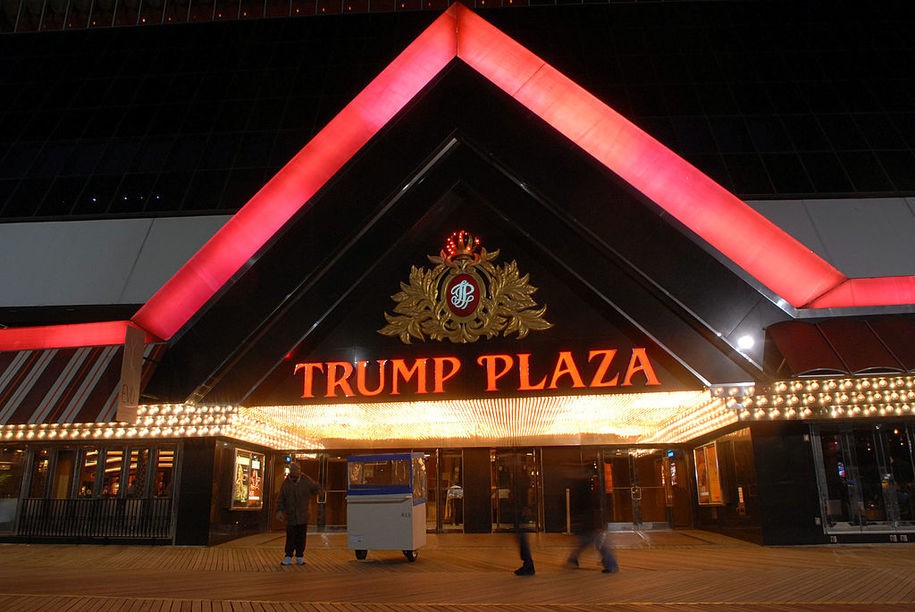LOOOOONNNNG but interesting article, especially with how Facebook is being used to drum up Trump's support
Inside the Trump Bunker, With 12 Days to Go
Win or lose, the Republican candidate and his inner circle have built a direct marketing operation that could power a TV network—or finish off the GOP.
On Oct. 19, as the third and final presidential debate gets going in Las Vegas, Donald Trump’s Facebook and Twitter feeds are being manned by Brad Parscale, a San Antonio marketing entrepreneur, whose buzz cut and long narrow beard make him look like a mixed martial arts fighter. His Trump tie has been paired with a dark Zegna suit. A lapel pin issued by the Secret Service signals his status. He’s equipped with a dashboard of 400 prewritten Trump tweets. “Command center,” he says, nodding at his laptop.
Parscale
Photographer: Alex Welsh for Bloomberg Businessweek
Parscale is one of the few within Trump’s crew entrusted to tweet on his behalf. He’s sitting at a long table in a double-wide trailer behind the debate arena, cheek to jowl with his fellow Trump staffers and Reince Priebus, chairman of the Republican National Committee. The charged atmosphere and rows of technicians staring raptly at giant TVs and computer screens call to mind NASA on launch day. On the wall, a poster of Julian Assange reads: “Dear Hillary, I miss reading your classified emails.”
10:02 p.m.: Trump, onstage, criticizes Hillary Clinton for accepting foreign money. “Fire it off!” Parscale barks. Instantly, a new Trump tweet appears: “Crooked @HillaryClinton’s foundation is a CRIMINAL ENTERPRISE. Time to #DrainTheSwamp!”
10:04 p.m.: Trump blames Clinton for $6 billion that went missing during her tenure at the State Department (actually a bookkeeping error). “Hit that hard,” shouts Jason Miller, Trump’s senior communications adviser. Parscale already has: “Crooked’s top aides were MIRED in massive conflicts of interest at the State Dept. WE MUST #DrainTheSwamp.”
10:09 p.m.: Trump deploys a carefully rehearsed WikiLeaks attack: “Podesta said some horrible things about you—and he was right.” The trailer erupts. “There it is!” someone shouts. “Push that,” Parscale commands. Within seconds, Trump’s roiling social mediasphere is bestowed with a curated Clinton burn from their leader: “Bernie Sanders on HRC: Bad Judgement [sic]. John Podesta on HRC: Bad Instincts #BigLeagueTruth.”
When the debate wraps, Parscale leaps up, open laptop still in hand, and bolts from the trailer with Priebus and the rest of the senior staff to congratulate Trump as he comes off the stage. In the wings, Parscale joins Steve Bannon, Trump’s Machiavelli and campaign chairman, on leave from Breitbart News Network; Dan Scavino Jr., his social media director; and a clutch of Trump children and their spouses, including Trump’s son-in-law, Jared Kushner, whom Parscale considers nearly a brother. Up on stage, Trump had been visibly upset, snapping at Clinton (“nasty woman”) and tearing a page from his notebook. But a moment later, when he emerges from a dark corridor with a phalanx of Secret Service agents, he’s thronged by his worshipful band of advisers, quasi-celebrities, and hangers-on. Parscale, tweeting as he walks, nearly misses him. Trump leans over to whisper into Bannon’s ear, and a Secret Service officer ushers Trump, Bannon, and Parscale toward a row of black SUVs. A moment later, they’re gone. Trump reclaims possession of his virtual self.
Parscale, now tweeting from his own account, celebrates the night’s haul: “HUGE 24hrs of online donations for @realDonaldTrump. 125,000+ unique donors grossing over $9,000,000! Thank you America! #MAGA.”
Featured in
Bloomberg Businessweek, Oct. 31-Nov. 6, 2016.
Subscribe now.
Photographer: Caroline Tompkins for Bloomberg Businessweek
Almost every public and private metric suggests Trump is headed for a loss, possibly an epic one. His frustrated demeanor on the campaign trail suggests he knows it. Yet even as he nears the end of his presidential run, his team is sowing the seeds of a new enterprise with a direct marketing effort that they insist could still shock the world on Election Day.
Beginning last November, then ramping up in earnest when Trump became the Republican nominee, Kushner quietly built a sprawling digital fundraising database and social media campaign that’s become the locus of his father-in-law’s presidential bid. Trump’s top advisers won’t concede the possibility of defeat, but they’re candid about the value of what they’ve built even after the returns come in—and about Trump’s desire for influence regardless of outcome. “Trump is a builder,” says Bannon, in a rare interview. “And what he’s built is the underlying apparatus for a political movement that’s going to propel us to victory on Nov. 8 and dominate Republican politics after that.”
If Trump wants to strengthen his hold on his base, then his apocalyptic rhetoric on the stump begins to make more sense. Lately he’s sounded less like a candidate seeking to persuade moderates and swing voters and more like the far-right populist leaders who’ve risen throughout Europe. Most Republican Party officials ardently hope he’ll go away quietly if he loses. But given all that his campaign—and Kushner’s group especially—has been doing behind the scenes, it looks likelier that Trump and his lieutenants will stick around. They may emerge as a new media enterprise, an outsider political movement, or perhaps some combination of the two: an American UK Independence Party (UKIP) that will wage war on the Republican Party—or, rather, intensify the war that Trump and Bannon have already begun.
To outsiders, the Trump campaign often appears to be powered by little more than the candidate’s impulses and Twitter feed. But after Trump locked down the GOP nomination by winning Indiana’s primary, Kushner tapped Parscale, a political novice who built web pages for the Trump family’s business and charities, to begin an ambitious digital operation fashioned around a database they named Project Alamo. With Trump atop the GOP ticket, Kushner was eager to grow fast. “When we won the nomination, we decided we were going to do digital fundraising and really ramp this thing up to the next level,” says a senior official. Kushner, this official continued, “reached out to some Silicon Valley people who are kind of covert Trump fans and experts in digital marketing. They taught us about scaling. There’s really not that much of a difference between politics and regular marketing.”
When Bannon joined the campaign in August, Project Alamo’s data began shaping even more of Trump’s political and travel strategy—and especially his fundraising. Trump himself was an avid pupil. Parscale would sit with him on the plane to share the latest data on his mushrooming audience and the $230 million they’ve funneled into his campaign coffers. Today, housed across from a La-Z-Boy Furniture Gallery along Interstate 410 in San Antonio, the digital nerve center of Trump’s operation encompasses more than 100 people, from European data scientists to gun-toting elderly call-center volunteers. They labor in offices lined with Trump iconography and Trump-focused inspirational quotes from Sheriff Joe Arpaio and evangelical leader Jerry Falwell Jr. Until now, Trump has kept this operation hidden from public view. But he granted
Bloomberg Businessweekexclusive access to the people, the strategy, the ads, and a large part of the data that brought him to this point and will determine how the final two weeks of the campaign unfold.
“We have three major voter suppression operations under way”
Several things jump out. Despite Trump’s claim that he doesn’t believe the polls, his San Antonio research team spends $100,000 a week on surveys (apart from polls commissioned out of Trump Tower) and has sophisticated models that run daily simulations of the election. The results mirror those of the more reliable public forecasters—in other words, Trump’s staff knows he’s losing. Badly. “Nate Silver’s results have been similar to ours,” says Parscale, referring to the polling analyst and his predictions at FiveThirtyEight, “except they lag by a week or two because he’s relying on public polls.” The campaign knows who it must reach and is still executing its strategy despite the public turmoil: It’s identified 13.5 million voters in 16 battleground states whom it considers persuadable, although the number of voters shrinks daily as they make up their minds.
Trump’s team also knows where its fate will be decided. It’s built a model, the “Battleground Optimizer Path to Victory,” to weight and rank the states that the data team believes are most critical to amassing the 270 electoral votes Trump needs to win the White House. On Oct. 18 they rank as follows: Florida (“If we don’t win, we’re cooked,” says an official), Ohio, Pennsylvania, North Carolina, and Georgia.
Trump believes he possesses hidden strength that may only materialize at the ballot box. At rallies, he’s begun speculating that the election will be like “Brexit times five,” implying that he’ll upend expectations much as the Brexit vote shocked experts who didn’t believe a majority of Britons would vote to leave the European Union. Trump’s data scientists, including some from the London firm Cambridge Analytica who worked on the “Leave” side of the Brexit initiative, think they’ve identified a small, fluctuating group of people who are reluctant to admit their support for Trump and may be throwing off public polls.
Still, Trump’s reality is plain: He needs a miracle. Back in May, newly anointed, he told
Bloomberg Businessweek he would harness “the movement” to challenge Clinton in states Republicans haven’t carried in years: New York, New Jersey, Oregon, Connecticut, California. “I’m going to do phenomenally,” he predicted. Yet neither Trump’s campaign nor the RNC has prioritized registering and mobilizing the 47 million eligible white voters without college degrees who are Trump’s most obvious source of new votes, as FiveThirtyEight analyst David Wasserman noted.
To compensate for this, Trump’s campaign has devised another strategy, which, not surprisingly, is negative. Instead of expanding the electorate, Bannon and his team are trying to shrink it. “We have three major voter suppression operations under way,” says a senior official. They’re aimed at three groups Clinton needs to win overwhelmingly: idealistic white liberals, young women, and African Americans. Trump’s invocation at the debate of Clinton’s WikiLeaks e-mails and support for the Trans-Pacific Partnership was designed to turn off Sanders supporters. The parade of women who say they were sexually assaulted by Bill Clinton and harassed or threatened by Hillary is meant to undermine her appeal to young women. And her 1996 suggestion that some African American males are “super predators” is the basis of a below-the-radar effort to discourage infrequent black voters from showing up at the polls—particularly in Florida.
Campaign staff in Trump Tower.
Photographer: Alex Welsh for Bloomberg Businessweek
On Oct. 24, Trump’s team began placing spots on select African American radio stations. In San Antonio, a young staffer showed off a
South Park-style animation he’d created of Clinton delivering the “super predator” line (using audio from her original 1996 sound bite), as cartoon text popped up around her: “Hillary Thinks African Americans are Super Predators.” The animation will be delivered to certain African American voters through Facebook “dark posts”—nonpublic posts whose viewership the campaign controls so that, as Parscale puts it, “only the people we want to see it, see it.” The aim is to depress Clinton’s vote total. “We know because we’ve modeled this,” says the official. “It will dramatically affect her ability to turn these people out.”
The Trump team’s effort to discourage young women by rolling out Clinton accusers and drive down black turnout in Miami’s Little Haiti neighborhood with targeted messages about the Clinton Foundation’s controversial operations in Haiti is an odd gambit. Campaigns spend millions on data science to understand their own potential supporters—to whom they’re likely already credible messengers—but here Trump is speaking to his opponent’s. Furthermore, there’s no scientific basis for thinking this ploy will convince these voters to stay home. It could just as easily end up motivating them.
Regardless of whether this works or backfires, setting back GOP efforts to attract women and minorities even further, Trump won’t come away from the presidential election empty-handed. Although his operation lags previous campaigns in many areas (its ground game, television ad buys, money raised from large donors), it’s excelled at one thing: building an audience. Powered by Project Alamo and data supplied by the RNC and Cambridge Analytica, his team is spending $70 million a month, much of it to cultivate a universe of millions of fervent Trump supporters, many of them reached through Facebook. By Election Day, the campaign expects to have captured 12 million to 14 million e-mail addresses and contact information (including credit card numbers) for 2.5 million small-dollar donors, who together will have ponied up almost $275 million. “I wouldn’t have come aboard, even for Trump, if I hadn’t known they were building this massive Facebook and data engine,” says Bannon. “Facebook is what propelled Breitbart to a massive audience. We know its power.”
Since Trump paid to build this audience with his own campaign funds, he alone will own it after Nov. 8 and can deploy it to whatever purpose he chooses. He can sell access to other campaigns or use it as the basis for a 2020 presidential run. It could become the audience for a Trump TV network. As Bannon puts it: “Trump is an entrepreneur.”
Whatever Trump decides, this group will influence Republican politics going forward. These voters, whom Cambridge Analytica has categorized as “disenfranchised new Republicans,” are younger, more populist and rural—and also angry, active, and fiercely loyal to Trump. Capturing their loyalty was the campaign’s goal all along. It’s why, even if Trump loses, his team thinks it’s smarter than political professionals. “We knew how valuable this would be from the outset,” says Parscale. “We own the future of the Republican Party.”
Like so many Trump die-hards, Parscale, 40, is an up-from-nothing striver who won a place in the Trump firmament by dint of his willingness to serve the family’s needs—and then, when those needs turned to presidential campaigning, wound up inhabiting a position of remarkable authority. He oversees the campaign’s media budget and supervises a large staff of employees and contractors, a greater number than report for duty each day at Trump Tower headquarters. “My loyalty is to the family,” he says. “Donald Trump says ‘Jump’; I say, ‘How high?’ Then I give him my opinion of where I should jump to, and he says, ‘Go do it.’ ”
Parscale was born in a small town outside Topeka, Kan., a self-described “rural jock” whose size—6-foot-8, 240 pounds—won him a basketball scholarship to the University of Texas at San Antonio. When injuries derailed his playing career, his interest turned to business. “The day I graduated, I skipped the ceremony to go straight to California for the dot-com boom,” he says. It was 1999. He became a sales manager for a video streaming company, taught himself programming, and eventually bought some of the company’s intellectual property, in digital video and 3D animation, and struck out on his own. But after the dot-com crash, his company failed, he got divorced, and by 2002 he was back in San Antonio, broke and unemployed.
Parscale and his colleagues in his Trump Tower office.
Photographer: Alex Welsh for Bloomberg Businessweek
He hustled consulting gigs, going door to door and cold-calling local businesses. “My first year, I tapped on shoulders in a bookstore to get my first customers, people who were buying web books, and asked if they needed help,” he says. One day in 2010, the phone rang. It was Kathy Kaye, the new head of Trump International Realty. “She said, ‘Would you like to bid on building the Trump website?’ ” Parscale recalls. “I said yeah. I bid $10,000 on the first website. I think they were shocked how cheap it was. Next thing I know, I’m talking to Ivanka. So they signed a contract with me, and I wrote the website by myself. I told ’em I’d give all the money back if they didn’t like it.”
The Trumps liked it. He eventually built sites for Trump Winery and the Eric Trump Foundation. When Trump launched a presidential exploratory committee, he knew who could build a website for him on the cheap: Parscale charged $1,500.
By then he’d partnered with a local designer and expanded into a design and marketing agency, Giles-Parscale. Trump’s own approach to self-promotion, reinforced by Kushner’s advice, was at odds with the highly targeted logic of the web. “If you’re running a burger shop, you have to let people know that your burgers are good and get them into your shop to buy them,” says a source close to the candidate. “It’s pretty similar with voting: You have to find out what people want and then convince them why your product is the right one.”
A poll map.
Photographer: Alex Welsh for Bloomberg Businessweek
Trump’s digital operation was focused primarily on tracking down the people who already liked his burgers and getting them to buy more. Parscale began toying with a list of registered voters acquired from a nonpartisan database vendor to learn more about who Trump’s backers were. Because the campaign hadn’t cultivated his supporters as donors or volunteers, most of what it knew about them came from requests for tickets to his rallies. After a March event in Chicago devolved into a melee, Parscale decided to stop relying on the ticketing service Eventbrite and build his own tool to accept RSVPs. He says he coded the program himself in two days so eventgoers would have to confirm via mobile phone. The added layer would weed out fraudulent requests placing tickets in protesters’ hands—and also collect supporters’ phone numbers.
Parscale was given a small budget to expand Trump’s base and decided to spend it all on Facebook. He developed rudimentary models, matching voters to their Facebook profiles and relying on that network’s “Lookalike Audiences” to expand his pool of targets. He ultimately placed $2 million in ads across several states, all from his laptop at home, then used the social network’s built-in “brand-lift” survey tool to gauge the effectiveness of his videos, which featured infographic-style explainers about his policy proposals or Trump speaking to the camera. “I always wonder why people in politics act like this stuff is so mystical,” Parscale says. “It’s the same shit we use in commercial, just has fancier names.”
As Kushner, who shares his father-in-law’s disdain for political professionals, became more active in the campaign’s operations, Parscale emerged from among dozens of vendors into a unique role. “Once Jared found Brad,” says a campaign official, “we were able to avoid building a big team and ran a lot of our back end through his office in San Antonio.”
After Trump won the Indiana primary, vanquishing his remaining rivals, Parscale had to integrate his do-it-yourself operation with two established players who would jostle for primacy as supplier of Trump’s data. The first was Cambridge Analytica, on whose board Bannon sits. Among its investors is the hedge fund titan Robert Mercer and his daughter, Rebekah, who were about to become some of the largest donors to the Trump cause. Locations for the candidate’s rallies, long the centerpiece of his media-centric candidacy, are guided by a Cambridge Analytica ranking of the places in a state with the largest clusters of persuadable voters. The other was the Republican National Committee, to which Trump relinquished control over many of its tactical decisions. “I told him he’s going to want to use the RNC once he’s the nominee,” says Newt Gingrich. “Reince has built a real system, and it can be very valuable to him.”
“That willingness to embrace what the RNC built allowed them to harness that movement”
Soon after Trump secured the nomination, a team from the RNC flew to San Antonio to meet Parscale at his favorite Mexican restaurant and discuss what party officials began describing as “the merger.” Priebus boasted then of having put “more than $100 million into data and infrastructure” since Mitt Romney’s 2012 loss. More than 10 percent of that cash went solely to beefing up the RNC’s e-mail list, which now has a dedicated department of a dozen people managing a list of more than 6 million supporters. To win access to them, Trump negotiated a partnership. The party’s online fundraising specialists would use his name and keep 80 percent of the revenue, while Trump’s campaign would get the remainder. “This is exactly what the party needed the RNC to do—building assets and infrastructure and the nominee gets to benefit from it,” says Chief Digital Officer Gerrit Lansing.
Trump’s team, which hadn’t actively raised money during the primaries, was unprepared. “I was put in the position of ‘We need to start fundraising tomorrow,’ ” says Parscale. That turn was so hasty that when, in late June, Trump sent out his first e-mail solicitation, it ended up in recipients’ spam folders 60 percent of the time. Typically marketers in that situation would have begun quietly blasting less important messages from a new server to familiarize spam filters with the sender’s address. Parscale shrugs off the ensuing criticism from technologists. “Should I have set up an e-mail server a month earlier? Possibly,” he says. “We also raised $40 million in two weeks. Woo-hoo, spam rating.”
Parscale was building his own list of Trump supporters, beyond the RNC’s reach. Cambridge Analytica’s statistical models isolated likely supporters whom Parscale bombarded with ads on Facebook, while the campaign bought up e-mail lists from the likes of Gingrich and Tea Party groups to prospect for others. Some of the ads linked directly to a payment page, others—with buttons marked “Stand with Trump” or “Support Trump”—to a sign-up page that asked for a name, address, and online contact information. While his team at Giles-Parscale designed the ads, Parscale invited a variety of companies to set up shop in San Antonio to help determine which social media ads were most effective. Those companies test ad variations against one another—the campaign has ultimately generated 100,000 distinct pieces of creative content—and then roll out the strongest performers to broader audiences. At the same time, Parscale made the vendors, tech companies with names such as Sprinklr and Kenshoo, compete
Apprentice-style; those whose algorithms fared worst in drumming up donors lost their contracts. Each time Parscale returned to San Antonio from Trump Tower, he would find that some vendors had been booted from their offices.
Parscale’s department not only paid for itself but also was the largest source of campaign revenue. That endeared it to a candidate stingy with other parts of the budget. When Trump fired his campaign manager, Corey Lewandowski, Parscale’s responsibilities grew, then further still when Lewandowski’s replacement, Paul Manafort, flamed out. In June, Parscale, whose prior political experience was a Bexar County tax assessor’s race (his client lost), became Trump’s digital director and, in many ways, the linchpin of his unusual run.
By the time Bannon became chief executive officer, Parscale had balanced the competition between the RNC and Cambridge Analytica, with different sources of data being tapped for the campaign’s fundraising appeals, persuasive communication, and get-out-the-vote contacts. “I’m the only one that hasn’t gained from any of this,” he says pointedly about the data rivalry.
In June, Parscale granted his first national interview, to
Wired, to preemptively explain why the Federal Election Commission was about to report that an unknown agency in San Antonio was the Trump campaign’s largest vendor. In August, Giles-Parscale handled $9 million in business from Trump’s campaign; two months later, the company’s total haul had cleared $50 million, most of it money passing through to online ad networks at little markup. Parscale was delivering his services at such a discount that Kushner even worried that the agency’s efforts might have to be classified as an in-kind contribution. “Jared’s a big part of what gave me my power and ability to do what I’ve been doing,” says Parscale, who sees himself as more than just a staffer. “Because you know what I was willing to do? I was willing to do it like family.”
There are signs that Trump’s presidential run has dealt a serious blow to his brand. His inflammatory comments about Mexican “rapists” and demeaning comments about women triggered a flood of busted deals and lost partnerships. Macy’s stopped making Trump-branded menswear, Serta halted its line of mattresses emblazoned with his logo, and celebrity chefs fled his new luxury hotel in Washington. Booking websites show that visits to Trump-branded hotels are down. Win or lose, Trump’s future may well lie in capitalizing on the intense, if limited, political support he has cultivated over the past year.
According to a source close to Trump, the idea of a Trump TV network originated during the Republican primaries as a threat Kushner issued to Roger Ailes when Trump’s inner circle was unhappy with the tenor of Fox News’s coverage. The warring factions eventually reconciled. But Trump became enamored by the power of his draw after five media companies expressed interest. “One thing Jared always tells Donald is that if the
New York Times and cable news mattered, he would be at 1 percent in the polls,” says the source. “Trump supporters really don’t have a media outlet where they feel they’re represented—CNN has gone fully against Trump, MSNBC is assumed to be against Trump, and Fox is somewhere in the middle. What we found is that our people have organized incredibly well on the web. Reddit literally had to change their rules because it was becoming all Trump. Growing the digital footprint has really allowed us to take his message directly to the people.”
It’s not clear how much of this digital audience will remain in Trump’s thrall if he loses. But the number should be substantial. “Trump will get 40 percent of the vote, and half that number at least will buy into his claim that the election was rigged and stolen from him,” says Steve Schmidt, John McCain’s 2008 presidential campaign chief and an outspoken Trump critic. “That is more than enough people to support a multibillion-dollar media business and a powerful presence in American politics.”
Kushner and Bannon at a Trump rally in Canton, Ohio, on Sept. 14.
Photographer: Alex Welsh for Bloomberg Businessweek
Digital strategists typically value contact lists at $3 to $8 per e-mail, which would price Trump’s list of supporters anywhere from $36 million to $112 million. The Trump enterprise could benefit from it in any number of ways. The easiest move would be for Trump to partner with Bannon’s global Breitbart News Network, which already has a grip on the rising generation of populist Republicans. Along with a new venture, Trump would gain a platform from which to carry on his movement, built upon the millions of names housed in Project Alamo. “This is the pipe that makes the connection between Trump and the people,” says Bannon. “He has an apparatus that connects him to an ever-expanding audience of followers.”
As it happens, this cross-pollination of right-wing populist media and politics is already occurring overseas—and Trump’s influence on it is unmistakable. In early October, the editor-in-chief of Breitbart London, Raheem Kassam, a former adviser to Nigel Farage, announced he would run for leader of UKIP. His slogan: “Make UKIP Great Again.”
The final ignominy for a Republican Party brought low by Trump is that its own digital efforts may undermine its future. The data operation in which Priebus and the RNC invested so heavily has fed into Project Alamo, helping Parscale build Trump’s base. “They brought to the table this movement and people who were willing to donate and activate, and we brought to the table a four-year investment and said we can process that for you,” says Sean Spicer, the RNC’s chief strategist. “That willingness to embrace what the RNC built allowed them to harness that movement.”
If the election results cause the party to fracture, Trump will be better positioned than the RNC to reach this mass of voters because he’ll own the list himself—and Priebus, after all he’s endured, will become just the latest to invest with Trump and wind up poorer for the experience.
http://www.bloomberg.com/news/articles/2016-10-27/inside-the-trump-bunker-with-12-days-to-go














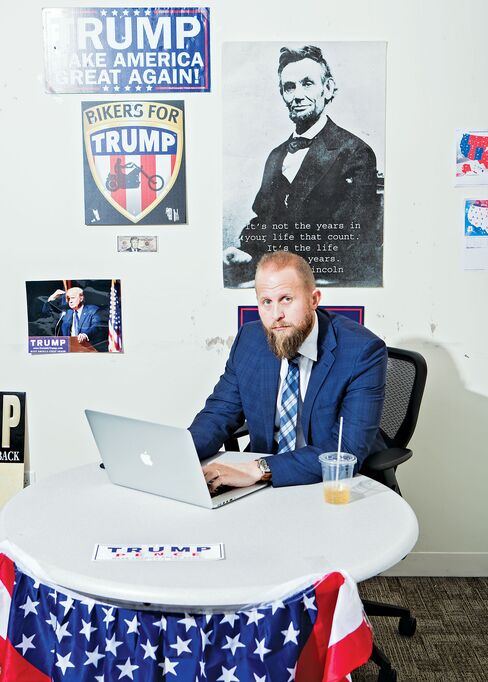
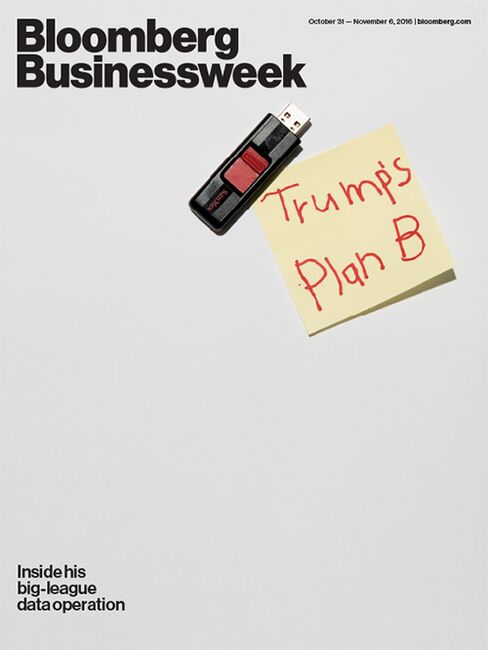

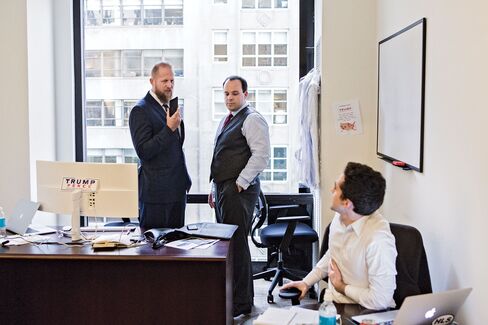
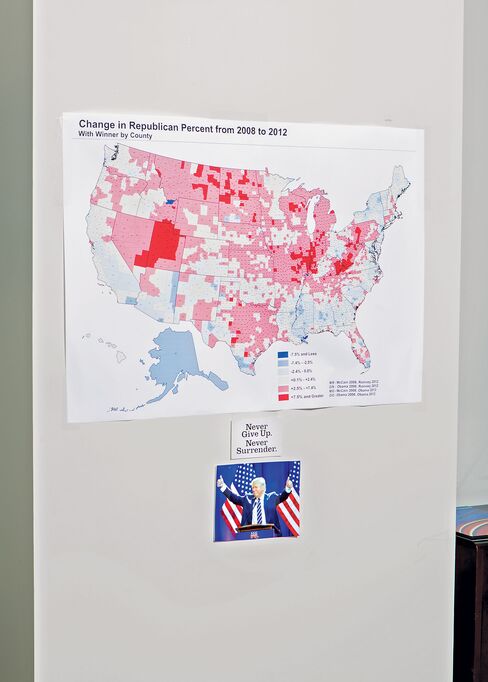
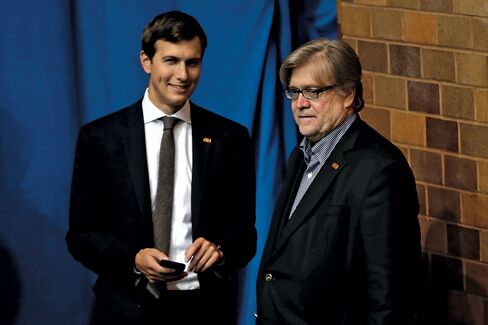

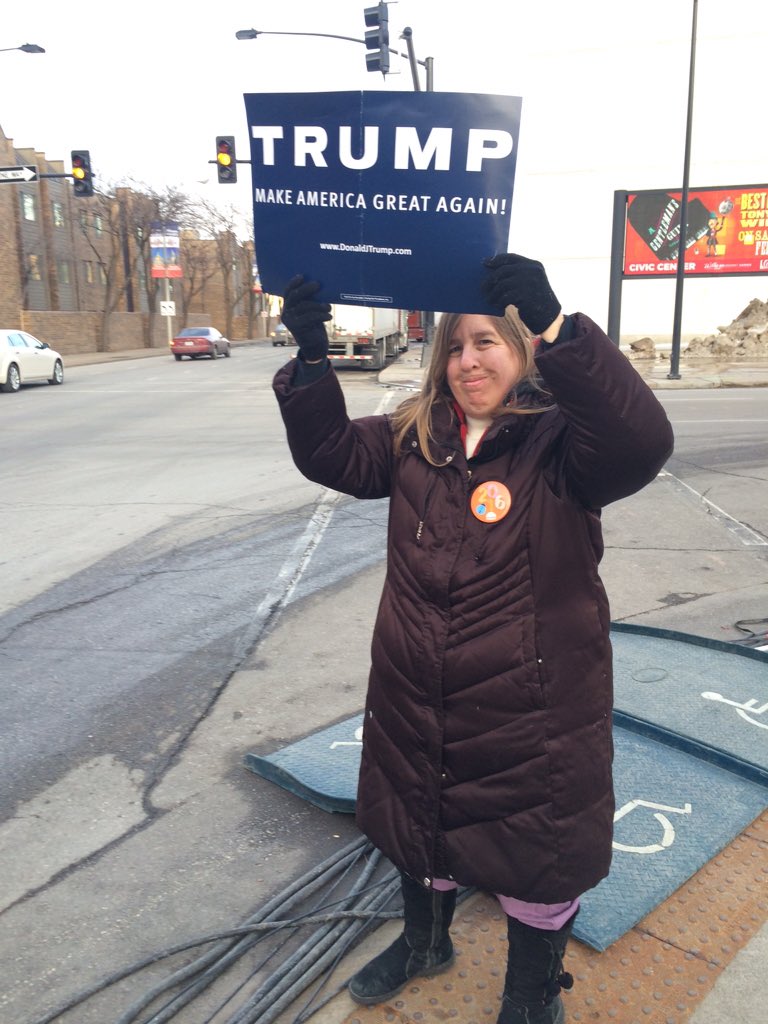
 Leigh Munsil✔@leighmunsil
Leigh Munsil✔@leighmunsil
